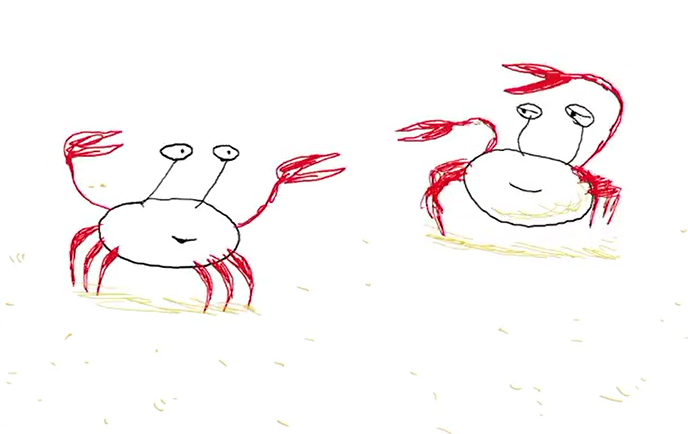All animals communicate.
所有动物都会相互交流。
Crabs wave their claws at each other to signal that they're healthy and ready to mate.
螃蟹相互挥舞钳子表明它们健康并准备交配。
Cuttlefish use pigmented skin cells called chromatophores to create patterns on their skin that act as camouflage or warnings to rivals.
乌贼使用叫做色素体的皮肤色素细胞在皮肤上创造图案形成伪装,用来迷惑或警示敌人。
Honeybees perform complex dances to let other bees know the location and quality of a food source.
蜜蜂通过表演复杂的舞蹈来让其他蜜蜂知道食物源的位置和质量。
All of these animals have impressive communication systems, but do they have language?
所有动物都有一流的交流系统,但它们有语言吗?

To answer that question, we can look at four specific qualities that are often associated with language: discreteness, grammar, productivity, and displacement.
为了回答这个问题,我们来看一下跟语言相关的4个特质:分离性、语法性、创造性和时空性。
Discreteness means that there is a set of individual units, such as sounds or words, that can be combined to communicate new ideas, like a set of refrigerator poetry magnets you can rearrange to create different phrases.
分离性是指一组独立单元比如声音或者词语,能够被组合在一起传达新的想法。就像贴在冰箱门上的诗词磁条可以通过重组来创建不同的词汇。
Grammar provides a system of rules that tells you how to combine those individual units.
语法性提供了一套规则,让你知道如何组合那些独立单元。
Productivity is the ability to use language to create an infinite number of messages.
创造性是运用语言来创造无限量信息的能力。
And displacement is the ability to talk about things that aren't right in front of you, such as past, future, or fictional events.
时空性是谈论那些不在眼前的事物,比如过去,未来或者虚构事件。
So, does animal communication exhibit any of these qualities?
那么,动物交流时会展现出其中的任何特质吗?
For crabs and cuttlefish, the answer is no.
就螃蟹和乌贼而言,答案是不会。
They don't combine their signals in creative ways.
它们不会以创新的方式来衔接这些信号。
Those signals also don't have to be in a grammatical order, and they only communicate current conditions, like, "I am healthy," or "I am poisonous."
那些信号没有必要按照语法的顺序排列,它们只交流现状,比如,“我很健康”,或者“我有毒”。
But some animals actually do display some of these properties.
但有一些动物们会展现出这些特性。
Bees use the moves, angle, duration, and intensity of their waggle dance to describe the location and richness of a food source.
蜜蜂们在舞蹈中通过摇摆舞的位置变动、角度、时长和强度来描述食物源的位置和丰富程度。
That source is outside the hive, so they exhibit the property of displacement.
食物源位于蜂巢之外,所以它们展现出了时空性。
They share that language trait with prairie dogs, which live in towns of thousands, and are hunted by coyotes, hawks, badgers, snakes, and humans.
它们分享了跟土拨鼠一样的语言特征,土拨鼠住在数千个城镇中,是土狼、老鹰、獾、蛇和人类的猎物。


